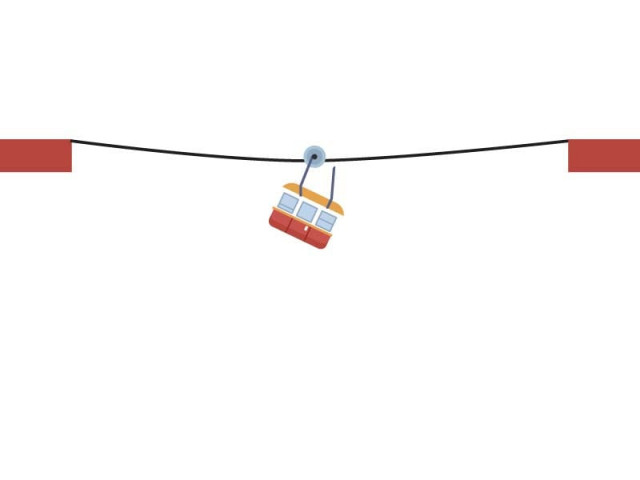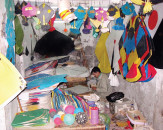Zapping on the ‘Dolly’
Cable cars a lifeline in inaccessible north

For local agriculturist Saddam Abbasi, now in his 50s, the day starts early. He is up around 4am – well before the sun rises over the scenic village of Birote Khurd on the foothills of the Mushkpuri mountains in Abbottabad.
One reason for this lifelong habit was due to the arduous daily trek down to the grain mill for the wheat that he grows to be ground into flour. The watermill was a mere seven kilometres but the treacherously zigzagging path with cross streams meant it took closer to 90 minutes – with the 50kg of wheat on his shoulder.
The market, a few kilometres from the mill, meant another brisk walk of 15-20 minutes. It was for everyday essentials, farm stuff and more. On the way back, he would tag along with village children returning from school, willing porters, to carry some of the items.
This back-breaking routine snapped in 2004 with the introduction of a cable car – referred to as ‘Dolly’ locally.
The homemade solution is usually made from the upper portion of a vehicle that serves as a cabin to seat and transport people. The cabin is attached to cables – often scrap iron – using ropes. This way, the residents can cross the area which would usually take hours in a matter of minutes.
Ijaz Ahmad, who runs the cable car in Birote, says he uses two strong iron cables, accompanied by a thinner connecting iron cable that is fastened to a pulley. This pulley is activated by a motor engine in a designated room. His cable car lift has a maximum weight capacity of 400 kilogrammes. The number of people goes up to 12 when he is transporting students.
For Abbasi, the trip to the watermill takes three minutes while being easy on the pocket. It costs far less than road travel, and while the fare varies depending on the distance being travelled, it begins from as little as Rs20.
He is now worried that the service might be discontinued after what happened in Battagram.
Dangling for life
On August 22, a chairlift carrying eight people – including six children – was stranded midway after a cable snapped. What followed was a day-long effort which ended with the passengers rescued but placed a spotlight on this mode of transportation.
As an unregulated mode of transportation, these dollies are not subject to any inspections for safety and maintenance. Locals say they have spoken to various departments and ministries but were only given a run-around.
Now they fear a blanket ban as is the case in any other calamitous incident in the country. In the wake of the incident, several such cable car services were suspended.
Waqar Qudoos, another regular user of the service, says any knee-jerk reaction could result in a return to the hardships of the past. “When it rained a lot, there were no bridges over the streams and it resulted in injuries and fatalities,” he said. It is essential for transporting people needing medical care, added Qudoos.
Seemab Abbasi, a local activist, concurred with Qudoos. People would carry patients on chairs and beds in the past, she said. It even resulted in miscarriages in the case of pregnant women, she continued.
The lack of easy and accessible commute meant children often would not be admitted to school, she continued. They were instead engaged in cattle herding or small jobs in nearby towns.
The situation was equally difficult for the teachers. Huma Ihsan of Mohra village said she had to walk seven kilometres of the most treacherous terrain to reach the school. “It previously took two hours but on the cable car it takes only two minutes,” she told The Express Tribune.
Another local educator, Mariyum Abbasi, acknowledged the benefits of the cable car while expressing concerns over the lack of safety measures. Children might try to open the gate during the ride or there could be another breakdown like the one in Battagram, she said.
Legislative legwork
Sarmad Faraz Abbasi, another Birote resident and a lawyer, says that the issue of cable cars requires appropriate legislation for its regularisation as it remained an essential mode of transport in the area due to its landscape.
But neither party seems interested in going forward, believes Abbasi. The lift owners were reluctant to come under the ambit of the law as it would mean taxes, inspections and adherence to standards.
Meanwhile, government departments like the departments of transport and industry – who should be part of the legislative and administrative process – are apathetic towards the situation. The Galiyat Development Authority has also shown little interest in the issue due to regulatory gaps, he said.
A spokesperson for the GDA, Ahsan Hameed, said these lifts were presently not subject to oversight under the GDA Act. He said their technical department would conduct a ‘comprehensive examination of these lifts’ and then collaborate with the divisional administration of Hazara to ensure the safety of human lives.
The Khyber Pakhtunkhwa government also mentioned the ‘comprehensive report’ to address the issue. The chief secretary’s office said initiatives were under way to establish regulations through the Directorate of Transport and Mass Transit Department.
Advocate Abbasi expects another round of furious activities in the wake of the Battagram incident but is sceptical of it turning into something substantial.
He cited a 2017 incident in Murree, where a chairlift accident led to the death of 12 individuals. Following the incident, the then-Punjab chief minister ordered the closure of these lifts. “But they resumed operations soon after without undergoing any inspections.”
He vowed to continue his efforts for legislation in the Peshawar High Court until ‘an acceptable solution’.
Published in The Express Tribune, September 15th, 2023.


















COMMENTS
Comments are moderated and generally will be posted if they are on-topic and not abusive.
For more information, please see our Comments FAQ